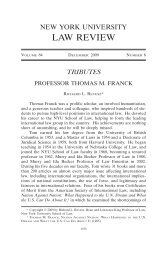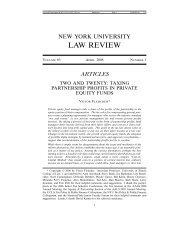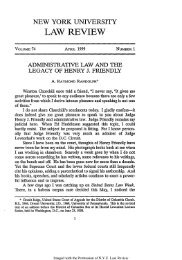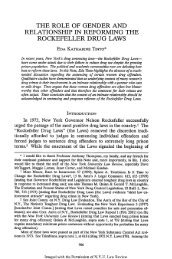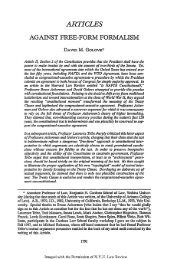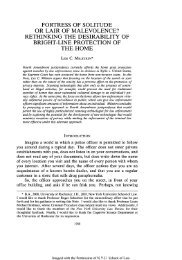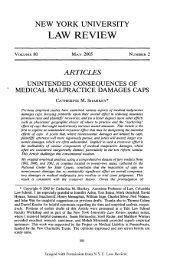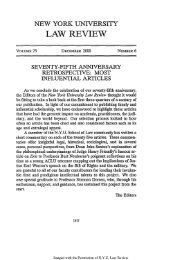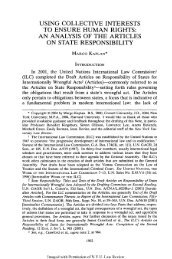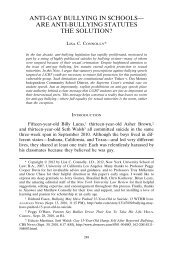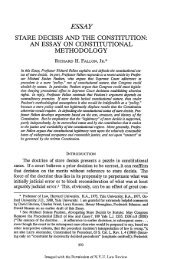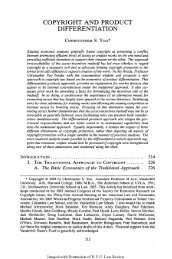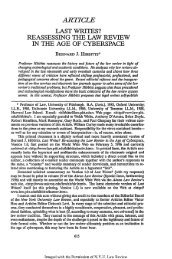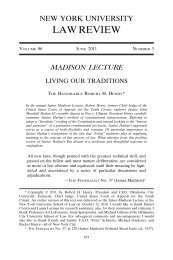Immigrants and the Right to Petition - NYU Law Review
Immigrants and the Right to Petition - NYU Law Review
Immigrants and the Right to Petition - NYU Law Review
You also want an ePaper? Increase the reach of your titles
YUMPU automatically turns print PDFs into web optimized ePapers that Google loves.
Imaged with <strong>the</strong> Permission of N.Y.U. School of <strong>Law</strong><br />
NEW YORK UNIVERSITY LAW REVIEW<br />
[Vol. 78:667<br />
tween subjects <strong>and</strong> noncitizens, as well as gradations within each category,<br />
95 <strong>and</strong> though English "subjectship" law imposed a range of<br />
disabilities on those who were not subjects, such as restrictions on<br />
ownership of real property, 96 all persons were capable of <strong>and</strong> did participate<br />
in petitioning. 97 As Professor Gregory Mark has demonstrated:<br />
"[<strong>Petition</strong>s] were a mechanism, indeed <strong>the</strong> formal<br />
mechanism, whereby <strong>the</strong> disenfranchised joined <strong>the</strong> enfranchised in<br />
participating in English political life... At some point or ano<strong>the</strong>r,<br />
members of virtually every stratum of society exercised <strong>the</strong> right on a<br />
wide variety of <strong>to</strong>pics . "..."98<br />
B. Citizenship <strong>and</strong> <strong>Petition</strong>ing in Colonial America<br />
Robust petitioning was also a central feature of political life in<br />
<strong>the</strong> American colonies. 99 <strong>Petition</strong>ing in <strong>the</strong> colonies dates <strong>to</strong> within<br />
days of <strong>the</strong> arrival of <strong>the</strong> first British settlers in James<strong>to</strong>wn, when "a<br />
murmur <strong>and</strong> grudg[e] against certayne preposterous proceedings, <strong>and</strong><br />
inconvenyent Courses" prompted a petition by disgruntled colonists<br />
<strong>to</strong> <strong>the</strong> James<strong>to</strong>wn Council. 00<br />
As in Engl<strong>and</strong>, petitioning facilitated resolution of private disputes,<br />
supplied colonial assemblies with crucial information regarding<br />
<strong>the</strong> concerns <strong>and</strong> views of residents, <strong>and</strong> enabled assemblies <strong>to</strong> exp<strong>and</strong><br />
<strong>the</strong>ir legislative jurisdictions. Not insignificantly, it also ensured that<br />
even <strong>the</strong> disenfranchised had an opportunity <strong>to</strong> participate in political<br />
95 James H. Kettner, The Development of American Citizenship, 1608-1870, at 5<br />
(1978) (listing different classes of subjects <strong>and</strong> aliens, including natural-born subjects, naturalized<br />
subjects, <strong>and</strong> denizens, as well as perpetual aliens, alien friends, <strong>and</strong> alien enemies).<br />
96 Id. at 5-9.<br />
97 1 William Blacks<strong>to</strong>ne, Commentaries *143 (describing "<strong>the</strong> right of petitioning <strong>the</strong><br />
king, or ei<strong>the</strong>r house of parliament, for <strong>the</strong> redress of grievances" as right "appertaining <strong>to</strong><br />
every individual" (emphasis added)).<br />
98 Mark, supra note 84, at 2169-70; see also id. at 2170 ("Virtually everyone.., had <strong>the</strong><br />
right <strong>to</strong> petition.").<br />
99 Raymond C. Bailey, Popular Influence upon Public Policy: <strong>Petition</strong>ing in Eighteenth-Century<br />
Virginia 166 (1979) ("[B]y 1607 <strong>the</strong> right of petition had long been recognized<br />
as a fundamental right of free Englishmen, <strong>and</strong> Virginians quickly initiated its use in<br />
<strong>the</strong> colony."); Andrews, supra note 89, at 604 ("[M]ost colonists viewed <strong>the</strong> right <strong>to</strong> petition<br />
<strong>the</strong>ir local governmental bodies as a fundamental 'common law' right."); Kramer,<br />
supra note 94, at 27 (describing "<strong>the</strong> right <strong>to</strong> petition, <strong>to</strong>ge<strong>the</strong>r with its companion, <strong>the</strong><br />
right of free speech," as second in importance only <strong>to</strong> voting as means of popular interpretation<br />
<strong>and</strong> enforcement of eighteenth-century fundamental law); Mark, supra note 84, at<br />
2175 ("Not only did <strong>the</strong> colonies explicitly or implicitly affirm <strong>the</strong> right <strong>to</strong> petition, <strong>the</strong>y did<br />
so repeatedly. In no case did <strong>the</strong> colonial affirmation of <strong>the</strong> right narrow <strong>the</strong> English<br />
right." (footnotes omitted)).<br />
100 Bailey, supra note 99, at 14-15 (quoting notes of Council <strong>and</strong> citing The Works of<br />
Captain John Smith liii (Edward Arber ed., 1967)).



